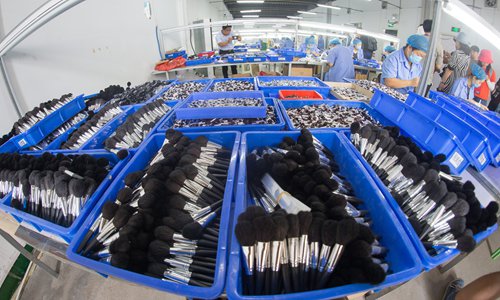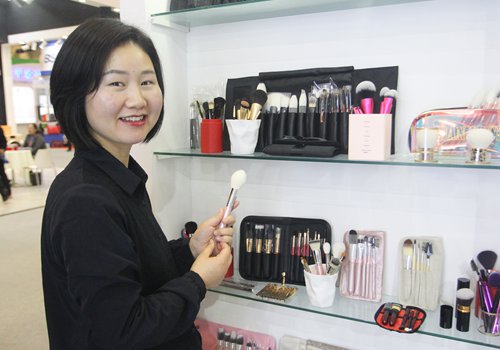HOME >> BUSINESS
Chinese makeup brush sector expands global presence
Source:Global Times Published: 2019/8/14 16:53:40
Demand for domestic beauty products growing at home and abroad

Workers manufacture makeup brushes on an assembly line at a plant in Luyi, Central China's Henan Province, on August 5. Photo: IC

A customer shops for makeup brushes at a store. Photo: IC
Luyi, a remote county in the eastern part of Central China's Henan Province, is nurturing a fashion-related business worth billions of yuan that has extended its presence across the globe.
Starting around 40 years ago, the local makeup brush industry has secured an annual output of 3.74 billion yuan ($530 million) and its products have been shipped to more than 20 countries and regions, the Henan Business Daily said in a recent report.
Employees of local makeup brush producers are mainly from nearby villages, yet they are aware of international fashion brands such as Chanel, L'Oréal and Estée Lauder.
Business origins
Makeup brush producers in Luyi can be categorized into two groups - those that developed from local hair-processing industries and those that were introduced from other provinces after 2016.
China did not have its own makeup brush businesses until the 1980s, when many foreign makeup brush firms settled in the country, and Shenzhen, South China's Guangdong Province, and North China's Tianjin Municipality began to operate the industries transferred from Japan and South Korea.
After China and South Korea established diplomatic relations in 1992, many South Korean makeup brush companies moved to China. Some shifted to Guanlan Town in Shenzhen and others landed in Qingxian, North China's Hebei Province, Liang Qingzhi, director of the Luyi Makeup Brush Industry Association, was quoted to have said in the report.
Guanlan Town has attracted many Luyi locals since the 1990s, as many followed the trend of finding jobs in southern China.
Since then, Luyi's local makeup brush business has been growing in Guanlan Town.
As of 2015, there were more than 500 Luyi locals who operated businesses in Shenzhen, and more than 20,000 skilled employees in the hair processing industry were from the county.
By the end of 2015, local governments in Luyi were stepping-up their efforts to bring in investment and business from other provinces. At the same time, first-tier cities like Shenzhen were undergoing transformations as labor-intensive industries shifted to middle and western parts of the country.
Luyi grasped its opportunity.
From 2016, the local government provided favorable policies for those who returned, including those related to land, loans, rent and utility fees, Tao Weihua, director of the Management Committee of the Industrial Agglomeration Area in Luyi, was quoted to have said in the report.
An industrial cluster, covering 1,500 mu (100 hectares), was approved and a special town for the makeup brush industry was established, according to Tao.
Sales of makeup brushes produced in Luyi account for more than 80 percent of total sales in the country.
Growth prospects
Local producers in Luyi have established long-term, cooperative relations with several global brands such as Guerlain, Dior, L'Oréal, Chanel, Estée Lauder and Avon.
Makeup brushes produced in Luyi have been sold to countries and regions like the US, France, Russia, Japan, South Korea, the EU and the Middle East.
But exports to the US have raised market concerns amid the trade war initiated by Washington, industry insiders said.
Since the US imposed tariffs on almost all Chinese exports, the Chinese makeup brush sector has been somewhat affected, Chen Min, CEO of Donger Media, told the Global Times on Monday.
Despite the US' questionable economic tactics, the possible price increase will be eventually borne by American consumers, according to Chen.
What matters is that producers in the makeup brush industry are expected to advance a complete industry chain, aiming to direct the local sector into a growth model similar to the small, commodity-production base of Yiwu, East China's Zhejiang Province, analysts said.
"China-made makeup brushes enjoyed popularity in overseas markets thanks to their cost-effectiveness," a Tianjin-based industry observer surnamed Yan told the Global Times on Monday.
In previous years, Chinese people seldom used makeup and domestically-made makeup brushes were all exported to foreign markets, Yan said, also noting that nowadays, the demand for such products continues to grow in the Chinese market.
Yan said that the flourishing e-commerce business will facilitate the further global exploration of domestic products.
China's makeup brush industry also stepped up efforts to upgrade by employing a robotic assembly line, which can enhance efficiency fivefold, according to Yan.
The story is based on a report by Henan Business Daily
Posted in: ECONOMY